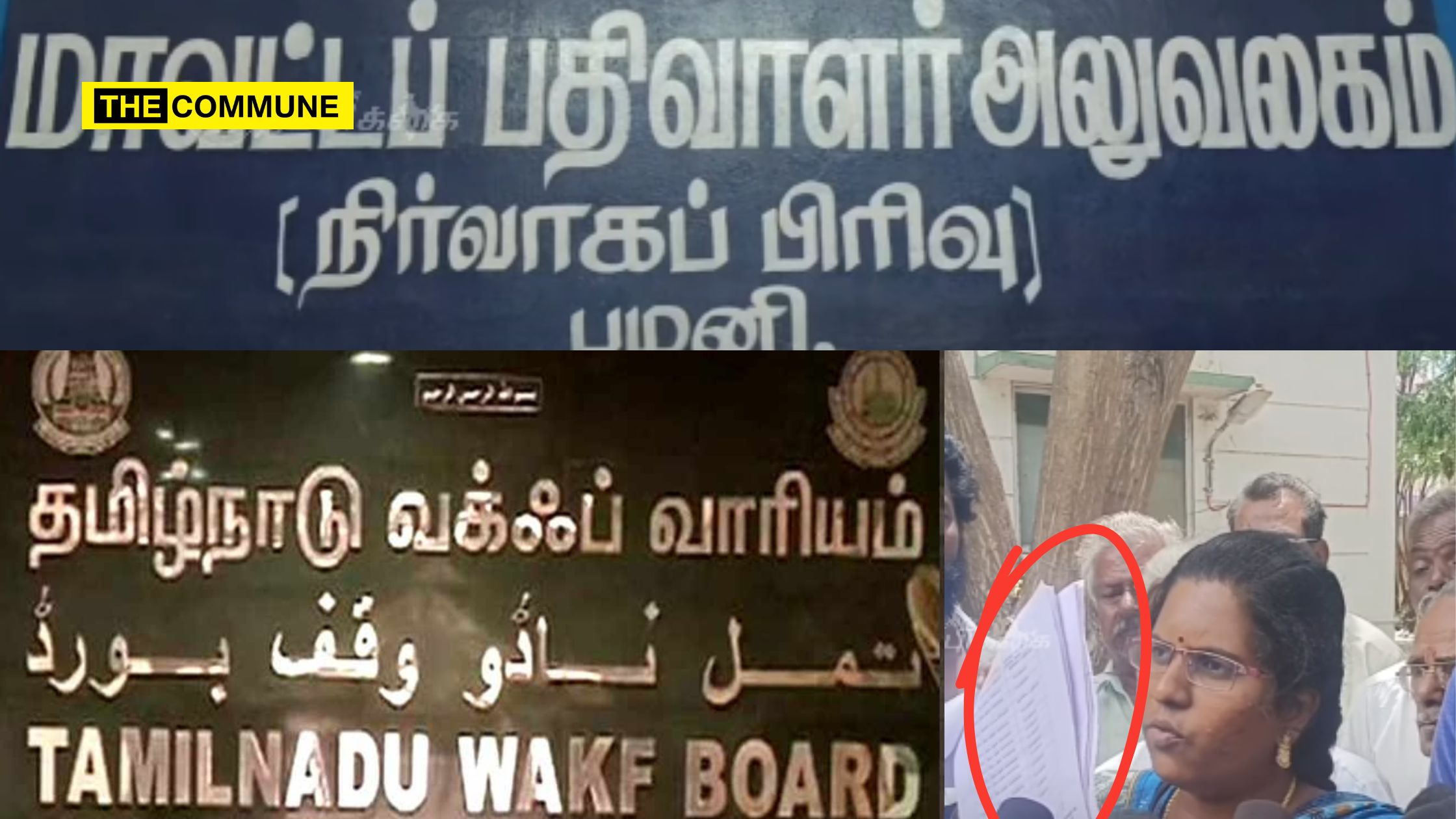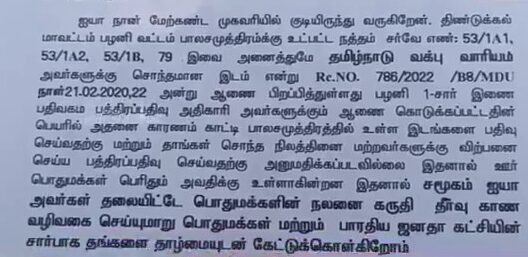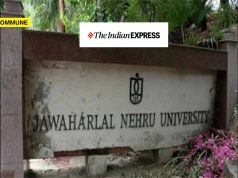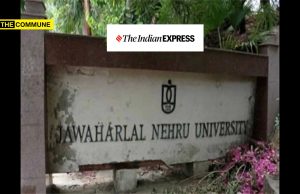
In a striking parallel to the Thiruchendurai village land dispute, another property conflict involving the Tamil Nadu Waqf Board has come to light, this time in the Balasamudram Municipality of Dindigul district. With claims dating back to 2020, the Waqf Board asserts ownership over the entire municipality, leaving around 10,000 residents in limbo. Unable to sell their ancestral properties due to unresolved legalities, the community’s frustration culminated in a petition to local authorities in May 2023.
Still, the deadlock remains, mirroring the challenges faced by those in Thiruchendurai.
Significant yet Underreported dispute with Waqf Board
In a development that didn’t receive much media coverage, this case in Balasamudram is worryingly similar to the Waqf Board claiming ownership of the entire village of Thiruchendurai, which, according to their records, spans 389 acres. Balasamudram Municipality is in the Palani area of the Dindigul district. Due to this claim by the Waqf Board, residents of these villages have been unable to buy or sell their properties.
The Balasamudram Municipality, which comprises 18 wards and approximately 10,000 residents, has been grappling with a property dispute. On 25 May 2023, the residents petitioned Tehsildar Siva Kumar of Palani, requesting a revision of property claims to sell their land—properties that have been in their families for generations. However, the Registration Department has not recognised their ownership, citing Tamil Nadu Waqf Board’s claim as per Re.No 786/2022. The Waqf Board made its claim on Balasamudram on 21 February 2020.
Priyanka, a villagers’ representative, has petitioned the Tehsildar and spoken to the press about the issue. She stated that “the residents cannot mortgage their lands due to the Waqf Board’s claim. The Registration Department has indicated that the land belongs to the Tamil Nadu Waqf Board based on old VAO records, specifically Survey Number 53/1A, which lists 96 acres as Waqf property. However, discrepancies exist between the Waqf Board’s survey and the patta numbers. The petition to the Tehsildar seeks to address these inconsistencies and facilitate proper land registration.“

Case from dindugal district.
Entire town panchayat "Bala samuthiram" near Pazhani claimed By Waqf Board 🥺🥺@narendramodi Government should act fast in this matter.#Modi #WaqfBoardBill pic.twitter.com/Nb7oWPJ3c0
— Matt murdock🚀 (@mattmurock123) August 9, 2024
The situation did not end there. A troubling aspect of the case is that while the villagers have been prevented from registering their lands, the Registration Department has allowed others to buy and sell properties in the same villages. Although the Waqf Board issued a claim notice in 2022, the Palani Registration Department continued processing registrations for Survey Number 53/1A up until March 2023. Petitioner Priyanka has alleged that action should be taken against the officers who facilitated these registrations.
Thiruchendurai Village Claimed As Waqf Property
Rajagopal of Mullikarupur, who owns agricultural land in Thiruchendurai village, agreed to sell 1 acre 2 cents of his land to one Rajarajeshwari. He went to the Joint III Sub-Registrar office in Trichy to arrange the purchase deed for ₹3.5 lakhs and get it registered.
However, the sub-registrar told him that the land could not be registered as it belonged to the Tamil Nadu Waqf Board and that he had to get a ‘No Objection Certificate’ from the state Waqf Board office in Chennai to sell the land. When Rajagopal asked why he needed a NOC from the Waqf Board to sell land he purchased in 1992, the sub-registrar reportedly told him that this is the procedure for deeding any land in Tiruchendurai village.
The Waqf Board has sent a letter to the Registration Department along with documents stating that the entire village belongs to them and that those who come to register a deed for land in the village should get an NOC from them.
He was also shown a copy of the 250-page Waqf Board letter. In that letter, the Waqf Board has said that tens of thousands of acres of land all over Tamil Nadu are theirs. Rajagopal later explained his ordeal to the people of Thiruchendurai village, who are now concerned about the Waqf Board’s takeover of their lands. They have noted that when they already have the revenue department documents, including patta, chitta, adangal, revenue ‘A’ registration, and encumbrance certificate, how can the Waqf Board claim Thiruchenthurai village as its property?
The issue was brought to the notice of the District Collector, who has reportedly assured to look into the matter and decide.
TN Registration Department
Tamil Nadu Government Registration Department officials have said there are encroachments on water bodies, Waqf Board properties, and temple properties. The department claims to have received information that, through forged documents, unrelated persons were holding these lands, and many were embroiled in legal disputes.
“The court criticised the government and directed it to take appropriate steps to recover the assets. Based on that, in 2016, the government took measures to recover the assets. Following this move, the Waqf Boards recovered their properties throughout Tamil Nadu. The Board sorted out what it found to be its assets and notified the department of them. They also asked the registration department to stop any arrangement for the registration of deeds regarding certain properties. It is on this basis that entire villages, including Thiruchendurai and Kadiakurichi, have been identified as Waqf Board properties.”, Registration Department officials were quoted saying in the report.
Officials also noted that they will speak to the Secretary of the Minority Welfare Department and the Chairman of the Waqf Board.
They admitted that it is absurd to refer to Thiruchendurai temple and its lands as Waqf Board properties and that they have been facing problems when deed registrations have to be denied based on the Waqf Board’s letter.
Apart from villages like Thiruchenthurai and Kadiakurichi, regions in and around Chennai also have this problem, where the Waqf Board has claimed lands.
Tamil Nadu Waqf Board
Tamil Nadu Waqf Board is a statutory body established under the Waqf Act 1954 that supervises and manages Waqf institutions and administers Waqf properties.
Waqf properties are those movable and immovable properties dedicated by a person professing Islam for any purpose recognised by Muslim law as pious, religious or charitable.
Subscribe to our channels on Telegram, WhatsApp, and Instagram and get the best stories of the day delivered to you personally.




